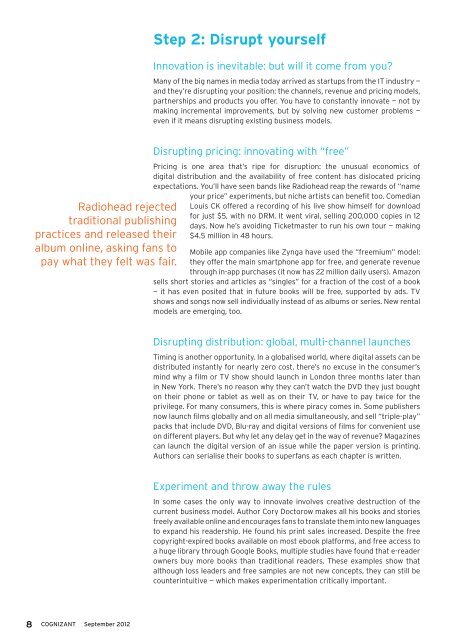Create successful ePaper yourself
Turn your PDF publications into a flip-book with our unique Google optimized e-Paper software.
Radiohead rejected<br />
traditional publishing<br />
practices and released <strong>the</strong>ir<br />
album online, asking fans to<br />
pay what <strong>the</strong>y felt was fair.<br />
8 COGNIZANT September 2012<br />
Step 2: Disrupt yourself<br />
Innovation is inevitable: but will it come from you?<br />
Many of <strong>the</strong> big names in media today arrived as startups from <strong>the</strong> IT industry —<br />
and <strong>the</strong>y’re disrupting your position: <strong>the</strong> channels, revenue and pricing models,<br />
partnerships and products you offer. You have to constantly innovate — not by<br />
making incremental improvements, but by solving new customer problems —<br />
even if it means disrupting existing business models.<br />
Disrupting pricing: innovating with “free”<br />
Pricing is one area that’s ripe <strong>for</strong> disruption: <strong>the</strong> unusual economics of<br />
digital distribution and <strong>the</strong> availability of free content has dislocated pricing<br />
expectations. You’ll have seen bands like Radiohead reap <strong>the</strong> rewards of “name<br />
your price” experiments, but niche artists can bene<strong>fit</strong> too. Comedian<br />
Louis CK offered a recording of his live show himself <strong>for</strong> download<br />
<strong>for</strong> just $5, with no DRM. It went viral, selling 200,000 copies in 12<br />
days. Now he’s avoiding Ticketmaster to run his own tour — making<br />
$4.5 million in 48 hours.<br />
Mobile app companies like Zynga have used <strong>the</strong> “freemium” model:<br />
<strong>the</strong>y offer <strong>the</strong> main smartphone app <strong>for</strong> free, and generate revenue<br />
through in-app purchases (it now has 22 million daily users). Amazon<br />
sells short stories and articles as “singles” <strong>for</strong> a fraction of <strong>the</strong> cost of a book<br />
— it has even posited that in <strong>future</strong> books will be free, supported by ads. TV<br />
shows and songs now sell individually instead of as albums or series. New rental<br />
models are emerging, too.<br />
Disrupting distribution: global, multi-channel launches<br />
Timing is ano<strong>the</strong>r opportunity. In a globalised world, where digital assets can be<br />
distributed instantly <strong>for</strong> nearly zero cost, <strong>the</strong>re’s no excuse in <strong>the</strong> consumer’s<br />
mind why a film or TV show should launch in London three months later than<br />
in New York. There’s no reason why <strong>the</strong>y can’t watch <strong>the</strong> DVD <strong>the</strong>y just bought<br />
on <strong>the</strong>ir phone or tablet as well as on <strong>the</strong>ir TV, or have to pay twice <strong>for</strong> <strong>the</strong><br />
privilege. For many consumers, this is where piracy comes in. Some publishers<br />
now launch films globally and on all media simultaneously, and sell “triple-play”<br />
packs that include DVD, Blu-ray and digital versions of films <strong>for</strong> convenient use<br />
on different players. But why let any delay get in <strong>the</strong> way of revenue? Magazines<br />
can launch <strong>the</strong> digital version of an issue while <strong>the</strong> paper version is printing.<br />
Authors can serialise <strong>the</strong>ir books to superfans as each chapter is written.<br />
Experiment and throw away <strong>the</strong> rules<br />
In some cases <strong>the</strong> only way to innovate involves creative destruction of <strong>the</strong><br />
current business model. Author Cory Doctorow makes all his books and stories<br />
freely available online and encourages fans to translate <strong>the</strong>m into new languages<br />
to expand his readership. He found his print sales increased. Despite <strong>the</strong> free<br />
copyright-expired books available on most ebook plat<strong>for</strong>ms, and free access to<br />
a huge library through Google Books, multiple studies have found that e-reader<br />
owners buy more books than traditional readers. These examples show that<br />
although loss leaders and free samples are not new concepts, <strong>the</strong>y can still be<br />
counterintuitive — which makes experimentation critically important.


